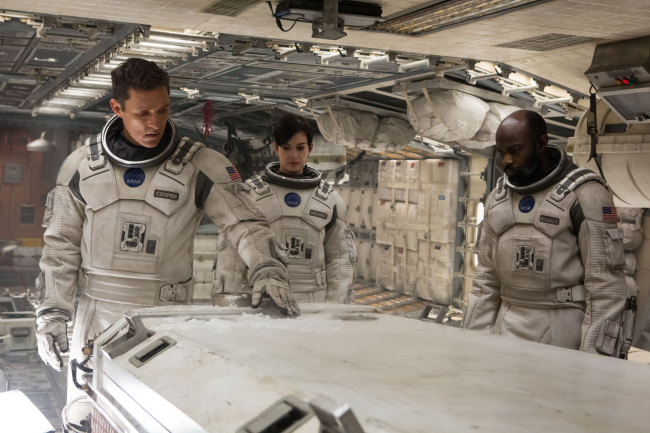Space has become a new theme powering ticket sales in Korean theaters of late, thanks to the growing interest in science as well as evolving visual technology.
The past three years at the Korean box office have seen a string of successful Hollywood movies set in space.
Alfonso Cuaron‘s “Gravity” set the spark in October 2013, followed by the blockbuster hit “Interstellar” by Christopher Nolan in November 2014, and “The Martian” and “Star Wars: The Force Awakens” just two months apart in late 2015. In 2016, “Interstellar” was rereleased in IMAX in response to popular demand.
 |
| Scene from Christopher Nolan’s “Interstellar” (Korean Film Council) |
Each of these movies pulled off impressive box office records, being watched by 3-5 million people. “Interstellar,” in particular, enjoyed unprecedented popularity in contrast to its disappointing sales in the U.S. market.
The film broke the 10-million mark, the standard for a blockbuster hit here.
Its popularity also pushed Korean scientists and professors to hold a series of public lectures to satisfy audiences’ curiosity on the mystery of space.
The unusual interest in space films may reflect Koreans’ desire for space travel — an unknown territory that the country has been striving to explore for many years.
 |
| Scene from Ridley Scott’s “The Martian” (Korean Film Council) |
“The reason why Interstellar became a box office hit in Korea is not only because the film itself was a masterpiece but also because of Koreans’ (natural) curiosity for space,” said Park Seok-jae, a senior researcher at Korea Astronomy and Space Science Institute in an interview with Yonhap News Agency.
“In fact, Koreans have shown their interest in space for a long time. They built an observatory (Cheomseongdae) 1,400 years ago and the county now has more than 100,000 amateur astronomers.”
The space movies also appears to have benefitted from the evolving film technology.
“With the addition of 3-D, space became an excellent setting to provide visual spectacle. Korean audiences respond to strong visual effects,” said culture critic Lee Moon-won.
 |
| Scene from J.J. Abrams’ “Star Wars: The Force Awakens” (Walt Disney Company Korea) |
Another culture critic, Kim Hern-sik, attributed Koreans’ enthusiasm for space movies to the changing nature of the genre’s storytelling.
“If you look at the recent movies, they’re a lot more emotional than previous sci-fi films,” he said, explaining that the drama made it easier for wider audiences to relate to the films. Kim also noted that in Korea, the majority of movie ticket-buyers were female, meaning successful films had to appeal to women as well.
“In ‘Gravity,’ you have a going-home story. In ‘Interstellar,’ there’s the story of a father’s love for his daughter. In ‘Martian,’ there’s a guy who’s just trying to raise potatoes and survive,” he said.
According to Kim, space movies are evolving in a way that reflects the struggles of modern life, being “recreated and rediscovered in the arena of space.”
They said that for most moviegoers in Korea, space was still a symbol of fantasy rather than science.
“It’s true that there were some events, like the successful launch of the Naro rocket (in 2013), that increased interest in space,” Lee said. “But in the end, it was about the spectacle and entertainment.”
By Won Ho-jung (hjwon@heraldcorp.com)



